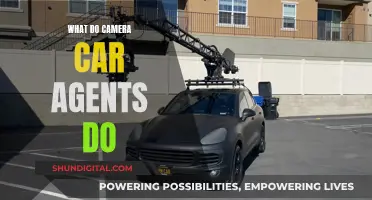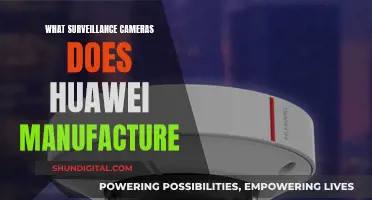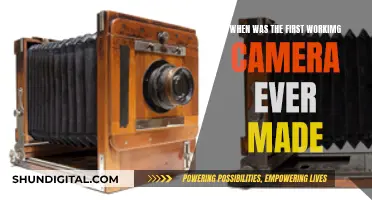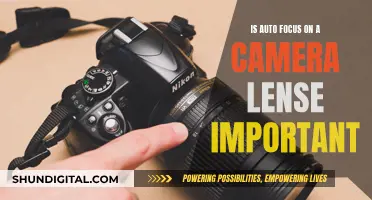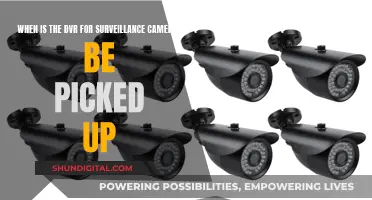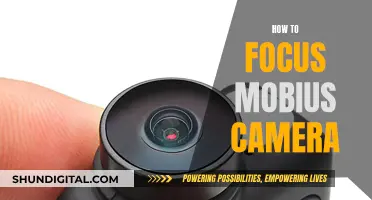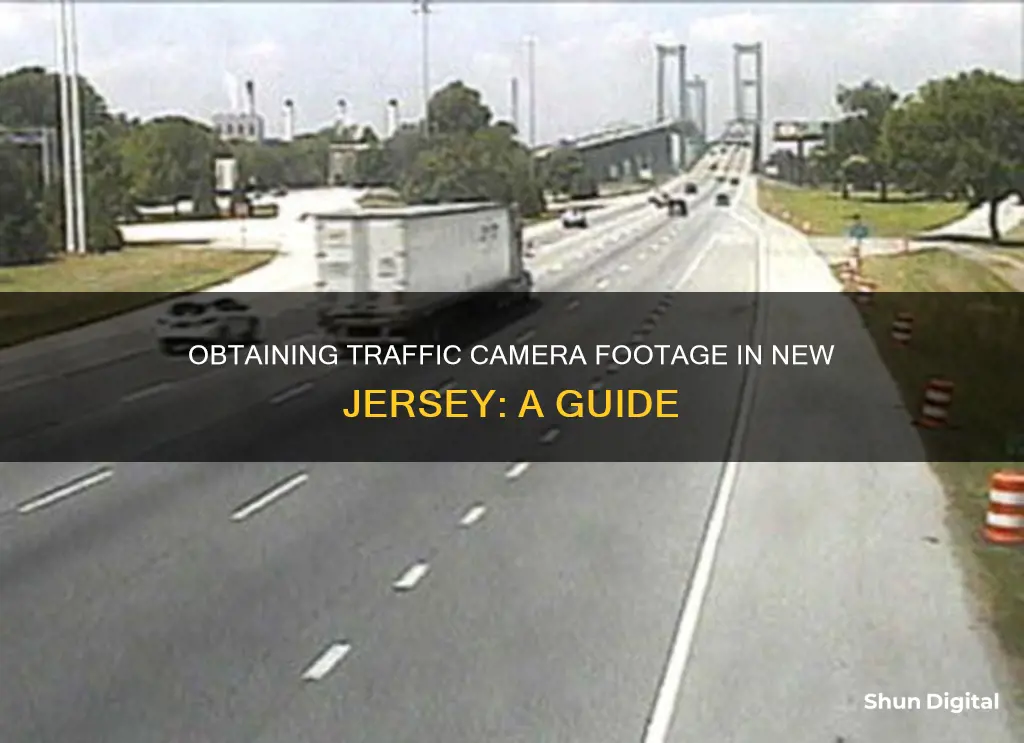
The New Jersey Department of Transportation (NJDOT) maintains traffic cameras on many interstates and other New Jersey State highway systems. The cameras are mounted on poles and record traffic conditions, delays, incidents, and weather conditions. The video is recorded and retained for seven days. A copy of a recording can be obtained by filling out a Traffic Camera Video Request Form. The form must be completed and submitted electronically, and a request must be made within seven days of a particular event or incident. The charge for a three-hour recorded time frame is $100, with an additional $50 for every extra three-hour period.
| Characteristics | Values |
|---|---|
| Agency responsible for traffic cameras | New Jersey Department of Transportation (NJDOT) |
| Purpose of traffic cameras | Managing traffic and identifying day-to-day traffic operational issues |
| Information recorded by traffic cameras | Traffic conditions, delays, incidents, and weather conditions |
| Location of traffic cameras | Public areas, mounted on poles |
| Retention period of video recordings | 7 days |
| Cost of obtaining footage | $100 for a 3-hour recorded time frame, $50 for each additional 3-hour period |
| Request procedure | Fill out the Video Log Request Form electronically within 7 days of the event or incident |
| Notification | NJDOT will notify requestors; payment is due within 30 days of notification |
| Request status | Requests may be denied, and NJDOT will provide an explanation via email |
What You'll Learn
- The New Jersey Department of Transportation (NJDOT) maintains traffic cameras
- Video is recorded and retained for seven days
- A copy of a recording can be obtained by filling out a Traffic Camera Video Request Form
- The request must be made within seven days of a particular event or incident
- The charge for a three-hour recorded time frame is $100

The New Jersey Department of Transportation (NJDOT) maintains traffic cameras
The NJDOT's video camera system retains recorded footage for seven days. If you wish to obtain a copy of a specific recording, you must act promptly within this timeframe. The process involves submitting a Traffic Camera Video Request Form, which can be found on the official NJDOT website. It's important to note that there is a fee associated with this service. The charge for a three-hour recorded time frame is $100, and for each additional three-hour period requested, an additional $50 fee applies.
It's worth mentioning that these traffic cameras should not be confused with traffic signal sensors located on traffic lights, which serve a different purpose of controlling signal timing. The NJDOT's camera system is an integral part of their traffic management strategy, aiding in identifying day-to-day operational issues and enabling quick and efficient responses to traffic incidents and emergencies.
To ensure a successful request, it's recommended to review the guidelines and requirements on the NJDOT website. The website will provide detailed instructions on how to properly fill out and submit the request form, along with any other relevant information or restrictions regarding the release of traffic camera footage. It's important to act quickly, as any requests made beyond the seven-day retention period will not be fulfilled.
Focusing an ASI1600 Camera: Tips and Tricks
You may want to see also

Video is recorded and retained for seven days
The New Jersey Department of Transportation (NJDOT) maintains traffic cameras on many interstates and other New Jersey State highway systems. The cameras are mounted on poles and record traffic conditions, traffic delays, incidents, and weather conditions. The cameras are monitored around the clock at the NJDOT's Statewide Traffic Management Center.
The charge for a three-hour recorded time frame is $100. For every additional three-hour period requested, a fee of $50 will be charged. After the request is made, the NJDOT will notify the requester. Payment is due within thirty days of the date of the notice. If no payment is received within this time frame, the requested information will be destroyed.
Charging the Explore One HD Camera: A Quick Guide
You may want to see also

A copy of a recording can be obtained by filling out a Traffic Camera Video Request Form
The New Jersey Department of Transportation (NJDOT) maintains traffic cameras on many interstates and other New Jersey State highway systems. The cameras are mounted on poles and record traffic conditions, traffic delays, incidents, and weather conditions. The cameras are monitored around the clock at the NJDOT's Statewide Traffic Management Center.
Video recorded by the cameras is kept for seven days before being automatically overwritten. To obtain a copy of a recording, you must fill out a Traffic Camera Video Request Form within seven days of a particular event or incident. The form must be completed and submitted electronically; requests by mail or fax are not accepted.
The charge for a three-hour recorded time frame is $100. For every additional three-hour period requested, a fee of $50 will be charged. After submitting your request, you will receive a notification from the NJDOT. Payment is due within 30 days of this notification. If no payment is received within this time frame, the requested information will be destroyed.
Testing Canary Surveillance Cameras: A Step-by-Step Guide
You may want to see also

The request must be made within seven days of a particular event or incident
The New Jersey Department of Transportation (NJDOT) maintains traffic cameras on many interstates and other New Jersey State highway systems. The cameras are mounted on poles and record traffic conditions, traffic delays, incidents, and weather conditions. The cameras are monitored 24/7 at the NJDOT Statewide Traffic Management Center.
The video recorded by these cameras is retained for seven calendar days. After seven days, the images are automatically overwritten by new recorded images. Therefore, it is important to note that any request for footage must be made within seven days of a particular event or incident. This includes weekdays and holidays.
To make a request, you must fill out a Video Log Request Form. Requests by mail or fax are not accepted. The charge for a three-hour recorded time frame is $100. For every additional three-hour period requested, a fee of $50 will be charged.
It is important to act quickly when requesting traffic camera footage, as the data is only stored for a limited time. Additionally, there may be specific requirements and procedures for releasing footage that can vary depending on the owning entity.
Unlocking RAW Image Potential: Editable Features Explained
You may want to see also

The charge for a three-hour recorded time frame is $100
The New Jersey Department of Transportation (NJDOT) maintains traffic cameras on several interstates and other New Jersey State highway systems. The cameras are mounted on poles and record traffic conditions, delays, incidents, and weather conditions. The cameras are monitored 24/7 at the Statewide Traffic Management Center. The video is recorded and kept at NJDOT for seven days, after which the images are automatically overwritten.
To obtain a copy of a recording, you must submit a request within seven days of the incident. The charge for a three-hour recorded time frame is $100. Each additional three-hour period requested will incur a $50 fee. You can make a request by filling out a Video Log Request Form. Requests by mail or fax are not accepted.
The process of obtaining traffic camera footage is not always straightforward, and there are several steps to follow. Firstly, you must identify the location of the traffic camera, which can be done by referencing the police report or contacting the local police department or the Department of Transportation. Once you have this information, you can determine the jurisdiction of the camera. This is important because different agencies have jurisdiction over different areas, and you need to contact the correct agency to obtain the footage.
After identifying the agency, you can reach out to their representatives. This can usually be done by phone, email, or through a specific website. You may need to download and fill out a form to make the formal request. It is recommended to have a lawyer complete this step, as they have experience in the process and can help you obtain a subpoena if needed.
Even with legal representation, obtaining traffic camera footage can be complicated and time-consuming. It is important to follow up on your requests through polite emails and phone calls to ensure your request is processed. Once you receive the footage, you should review it to ensure it is the correct footage and captures the incident in question.
While traffic camera footage can be valuable evidence, it is not always available. Smaller roads and residential areas may not have cameras, so it is important to consider alternative sources of evidence, such as dashcam footage, eyewitness accounts, and surveillance cameras from nearby businesses.
Camera Batteries: Drain or Top-Up for Best Performance?
You may want to see also


